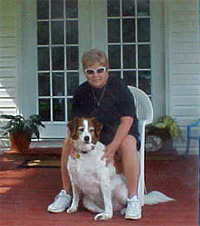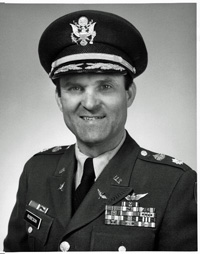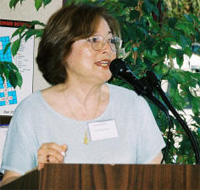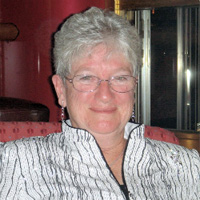Tom Howard/John H. Reid Short Story Contest 2011
Congratulations to the winners of the 2011 Tom Howard/John H. Reid Short Story Contest
Most Highly Commended $150
- William (Bing) Bingham, Sea of Dreams
- Mark Carlson, In Defense of the Book
- Liz Davies, Back Story
- Cyndee Hollamon-Cook, Elizabeth
- Judy Willman, The Remembering Dreams
- Carla M. Zwahlen, Silent Night
First Prize, $3,000 - Judith Koenig, USA
"Bailey Is in Heaven"
The judges said, "Here is a moving, heart-tugging account of love and redemption that is most skillfully written. One of the most difficult feats facing a storyteller lies in the art of making his or her story utterly convincing. We all know that once a narrative loses credibility, reader interest will wane. In a genre piece, however, the writer's efforts must not only be directed to avoiding the negative, but must particularly focus on building up an appropriately realistic background, peopled by thoroughly credible yet extremely likable characters. To do this, it's often necessary to break one of the so-called 'iron-clad rules' of the short story form, namely to avoid introducing material that has no direct bearing on either the plot or its people. By breaking this 'rule', Judith Koenig has crafted an overwhelmingly powerful story that will leave readers wholly convinced the events and characters are real." — John H. Reid
"This story starts with a gentle, peaceful introduction that moves into a powerful account of love and human devotion to a pet. Pets become highly important to individuals, as in this recital of 'Bailey'. It's sweet, and the reader can decide for herself if she believes in the 'supernatural twist' at the end. Above all, the critical role of a pet in a human's life is key to the love described here in special terms." — Dee C. Konrad
Second Prize, $1,000 - Robert B. Robeson, USA
"Remembering August 20, 1969 on Memorial Day"
The judges said, "Colonel Robeson's is a truly inspiring account of one man's service to his country, his allies and his enemies. In writing a memoir or real-life essay, an author must carefully consider where to start, what to leave in and what to leave out, and how to come to a forceful finish that doesn't leave readers up in the air. Few authors have answered these problems with the skill and expertise that Robert Robeson brings to his terrifying yet continually uplifting story of courage, perseverance and comradeship." — John H. Reid
"In trying to express strong feelings we have about those who help us in the military, many individuals fall short of true expression to which we can relate. Mr. Robeson has a special ability to say what we think and feel—and that is a rare gift in this form of writing." — Dee C. Konrad
Third Prize, $400 - Lucille Bellucci, USA
"Cicadas"
The judges said, "Although the author described this entry as fiction, it seems so horrifyingly detailed and realistic the judges can only conclude that it is indeed based on actual incidents in an actual street in pre-WW2 Shanghai. The setting is so forcefully described, readers can actually see it, smell it, feel it; and be repulsed or drawn to its most credibly delineated characters. The plot has the sweep of truth, and rarely have we seen storybook people described with such sympathy and understanding, yet such uncompromising reality." — John H. Reid
"Life in China was very different at one time for the non-Chinese living there. The complacency and lack of understanding by others is highlighted by one woman who does feel concern for two Chinese camping outside her home. The noise of the cicadas sounds in the readers' ears as a form of truth about the real China; and the young boy who eats a cicada sets a pattern, distasteful and disturbing. That one woman can make a small difference shrieks at the reader. The point of needing more understanding seems only too clear." — Dee C. Konrad
Fourth Prize, $250 - Ina L. Jones, USA
"One Man's Legacy"
The judges said, "A perfect gem of a story, this beautifully observed miniature embodies all the concentrated strength that results from a unity of time, place, people and plot. Just about all the 'action' occurs in one room over a very short space of time. There are only three principal characters—and even one of these stands firmly in the background. The story really comes down to just one word: Acceptance! But what a word that is! The narrator's whole world revolves around that one earnest desire. 'Acceptance' becomes so alive in the thoughts and actions of the narrator that she captures both our sympathy and interest almost right from the start. We readily understand not only her love and forbearance, but above all, her positive yearning to be accepted by her father. We agonize with her when all seems lost, and we rejoice at her ultimate discovery!" — John H. Reid
"This story has the power and strength found in love that survives many 'rides' with their various 'bumps'. One intuits the deep affection the daughter has for her father and the lasting quality of that love through their individual bike rides in life. The knowledge that she was truly important to him comes as his death opens a special door of realization for her." — Dee C. Konrad
Contest Judges
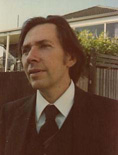
John Reid
John Howard Reid, founder of the Tom Howard/John H. Reid Fiction & Essay Contest and the Tom Howard/Margaret Reid Poetry Contest, won first prizes and other awards in prestigious literary events. A former journalist and magazine editor, he published several historical novels, a collection of poetry, a guide to winning literary contests, and over fifty books of film criticism and movie history. See his work at Lulu. He lived in Wyong, Australia, and passed away in 2018.
Contest Judges
Dee C. Konrad
A leading educator and published author, Mrs. Dee Konrad was Associate Professor in the English faculty of Barat College of DePaul University, and served as Dean of Liberal Arts and Sciences for the year 2000-2001.







